Bangladesh University of Engineering and Technology
Bangladesh University of Engineering and Technology (Bengali: বাংলাদেশ প্রকৌশল বিশ্ববিদ্যালয়, [bangladesh prokoushol bishwabiddyaloy]), commonly known as BUET (pronounced [bue̯eʈ]; Bengali: বুয়েট), is a public university in Bangladesh, which focuses on the study of Engineering and Architecture.[2] Founded in 1912, it is the oldest institution for the study of Engineering (initially it was a diploma school), Architecture and Urban Planning in Bangladesh.[3]
বাংলাদেশ প্রকৌশল বিশ্ববিদ্যালয় | |
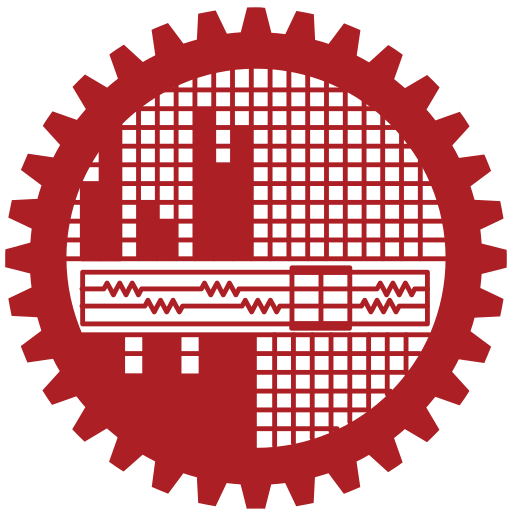 | |
| Type | Public engineering university |
|---|---|
| Established | 1876: Dhaka Survey School 1908: Ahsanullah School of Engineering 1947: Ahsanullah Engineering College, University of Dhaka 1962: EPUET 1971: BUET |
Academic affiliations | UGC |
| Endowment | ৳1.024 billion (2015-16) ($13 million)[1] |
| Chancellor | President of the People's Republic of Bangladesh |
| Vice-Chancellor | Satya Prasad Majumder |
Academic staff | 579(February 2020)[1] |
Administrative staff | 1,338 (February 2020)[1] |
| Students | 9,234 (February 2020)[1] |
| Undergraduates | 5,636 (February 2020)[1] |
| Postgraduates | 3,598 (February 2020)[1] |
| Location | , Bangladesh |
| Campus | Urban, 91.37 acres (36.98 ha)[1] |
| Language | English |
| Nickname | BUET (বুয়েট) |
| Sports | Cricket, Football and others |
| Website | buet |
With the construction of new academic buildings, an auditorium complex, a cafeteria and halls of residence, the university has continued to expand over the last three decades.
History
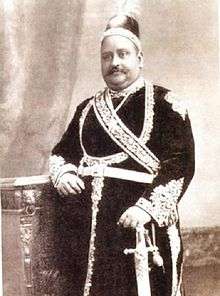
Dacca Survey School was established in 1876 as a survey school at Nalgola, west of the current Sir Salimullah Medical College campus, in Old Dhaka by the then Government of Bengal under British Raj.[4] It offered a survey course of two years to train land surveyors, at the end of which students competed at the Sub-Overseer's examination.[5] According to a report on public instruction in Bengal, on 31 March 1903, Dacca Survey School had 117 students of which 103 were Hindus and 14 were Muslims.[6] In 1908, the school started to offer diploma degrees.[7] Nawab Sir Khwaja Ahsanullah Bahadur, a philanthropist and Nawab of Dhaka, endowed donations for developing the survey school. After his death in 1901, his son, the then Nawab of Dhaka, Sir Khwaja Salimullah Bahadur released 112,000 rupees grant in 1902 in accordance.[8] As an acknowledgement of this contribution, the school was renamed to Ahsanullah School of Engineering in 1908.
The school offered three-year long diploma courses in civil engineering, electrical engineering and mechanical engineering in 1908. In 1912, the university was moved to its present premises.[3] In 1938, A. K. Fazlul Huq, the then Prime Minister of Bengal, appointed Hakim Ali as the principal of the school.[7]
After the partition of India in 1947, Chief Minister of East Bengal Sir Khwaja Nazimuddin approved the school to be upgraded to Ahsanullah Engineering College, as a Faculty of Engineering under the University of Dhaka, offering four-year bachelor's course in Civil, Electrical, Mechanical, Chemical and Metallurgical engineering.[3] In 1948, the Government of East Bengal granted recognition to the engineering college. Ali became the first principal of the college.[7] In 1951, TH Mathewman was appointed the next principal. M. A. Rashid succeeded him in 1954 as the first Bengali principal of the college[9] and held the post until 1960.[10] In 1956, a new course curriculum and the semester system were introduced at the college.[7]
On 1 June 1962, in order to create facilities for postgraduate studies and research, the college was upgraded to East Pakistan University of Engineering and Technology (EPUET), becoming the fourth university of the then East Pakistan.[7] Rashid was appointed the first vice-chancellor of the university. A partnership with the Agricultural and Mechanical College of Texas (renamed Texas A&M University) was forged, and professors from A&M came to teach and formulate the curriculum. During this period, EPUET offered courses in mechanical, electrical, civil, metallurgical, and chemical engineering, and architecture.
After the liberation war of 1971, and Bangladesh's independence, EPUET was renamed to Bangladesh University of Engineering and Technology (BUET).[3]
Several other departments offer graduate and undergraduate courses in different subjects: Water resources engineering, Urban and regional planning, Naval architecture and marine engineering, Industrial and production engineering, Petroleum and mineral resources engineering, Computer science and engineering, Glass and ceramic engineering, and Biomedical engineering. These courses were all added to the university at different times.
In 2007, BUET celebrated 60 years (1947–2007) of engineering education in Bangladesh by arranging a 6-month-long series of programs and events.[11]
Academics
Faculties and departments
Academic activities are undertaken by 18 departments under five faculties.[12] Twelve departments offer undergraduate courses. All of the departments aside from the department of Humanities offer postgraduate courses.[12]
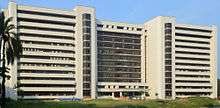
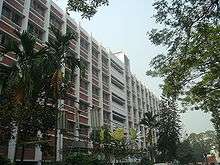
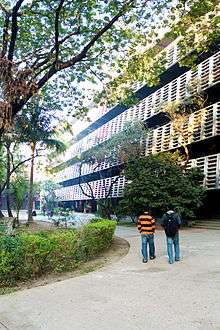
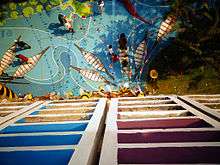
- Faculty of Architecture and Planning:
- Department of Architecture (Arch)
- Department of Urban and Regional Planning (URP)
- Department of Humanities (Hum)
- Faculty of Civil Engineering:
- Department of Civil Engineering (CE)
- Department of Water Resources Engineering (WRE)
- Faculty of Electrical and Electronic Engineering:
- Department of Electrical and Electronic Engineering (EEE)
- Department of Computer Science and Engineering (CSE)
- Department of Biomedical Engineering (BME)
- Faculty of Mechanical Engineering:
- Department of Mechanical Engineering (ME)
- Department of Industrial and Production Engineering (IPE)
- Department of Naval Architecture and Marine Engineering (NAME)
- Faculty of Engineering:
- Department of Chemical Engineering (ChE)
- Department of Materials and Metallurgical Engineering (MME)
- Department of Chemistry (Chem)
- Department of Mathematics (Math)
- Department of Physics (Phys)
- Department of Petroleum and Mineral Resources Engineering (PMRE)
- Department of Glass and Ceramic Engineering (GCE)
Institutes
At present, there are six institutes in BUET. These institutes offer postgraduate diplomas, master's and doctoral degrees.[13]
- Institute of Water and Flood Management (IWFM)
- Institute of Appropriate Technology (IAT)
- Institute of Information and Communication Technology (IICT)
- Accident Research Institute (ARI)
- BUET-Japan Institute of Disaster Prevention and Urban Safety (BUET-JIDPUS)
- Institute of Nuclear Power Engineering (INPE)
Research Centers
- Centre for Energy Studies (CES)
- Centre for Environmental and Resource Management (CERM)
- Biomedical Engineering Centre (BEC)
- Bureau of Research, Testing & Consultation (BRTC)
- International Training Network Centre (ITN)
- Bangladesh Network Office for Urban Safety (BNUS)
Directorates
- Directorate of Advisory, Extension and Research Services (DAERS)
- Directorate of Students' Welfare (DSW)
- Directorate of Planning and Development (P&D)
- Directorate of Continuing Education (DCE)
Journals and Research Bulletins
- Journal of Mechanical Engineering Research and Developments
- Chemical Engineering Research Bulletin
- Bangladesh Journal of Water Resources Research
- Electrical and Electronic Engineering Research Bulletin
- Protibesh (Research Journal on Architecture)
Rankings
| University rankings | |
|---|---|
| Global – Overall | |
| QS World[14] | 801-1000 (2021) |
BUET has been ranked 175th among the Asian universities in the 2019 edition of QS World University Rankings.[15] BUET has been ranked No. 801-1000 among all universities on QS World University Rankings.[16]
Library
BUET central library has a collection of 142,913 items of information materials. Among the materials, 125,066 and 17,847 are books and bound periodicals respectively.[17] Besides, 141 titles are in the current subscription list of journals.[17] Every year, 1500 volumes are added to this library.[17] The main reading room of the central library can accommodate 200 students at a time to provide reading facilities of rare and out-of-print books, and also ready reference and prescribed textbooks. There are also departmental libraries in each of the departments and institutes and hall libraries in each of the residence halls.
Convocations
After the independence of Bangladesh and the subsequent name change, the first convocation of the university was held in 1973.[18] Since then, convocations have been held in 1976, 1992, 1993, 1997, 2001, 2004, 2005, 2006, 2011 and 2019.[19]
Administration
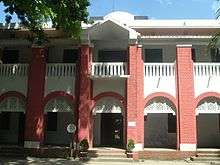
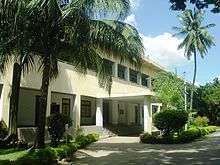
The Chancellor is the ceremonial head of the university who appoints the Vice-chancellor. The position is held by the incumbent President of Bangladesh.[20] The Vice-chancellor is the executive head of the university. The position is always held by a senior Professor of the university. The university is administered by the University Syndicate which is chaired by the Vice-chancellor. Members of the Syndicate include Deans of several faculties, Director General of Secondary and Higher Education in Bangladesh, Director General of Technical Education in Bangladesh, eminent academics from this university as well as from other famous public universities.[20] Each of the faculties is headed by a Dean and each of the departments is chaired by a Head of the department.[20] They are generally full professors from their respective faculties and departments. Institutes, Research Centers and Directorates are headed by the Directors who are full professors from relevant fields of research.[20] Other major administrative posts include the Registrar, the Comptroller and the Controller of Exams.
The university has also the following Statutory Authorities.[20]
- Academic Council
- Finance Committee
- Faculties
- Selection Boards
- Committee for Advanced Studies and Research (CASR)
- Planning and Development Committee
- Boards of Postgraduate Studies (BPGS)
- Boards of Undergraduate Studies (BUGS)
The University Syndicate is the supreme authority in major policy-making matters and in approving recommendations. The Finance Committee, the Planning & Development Committee and other committees assist the Syndicate in matters important for the proper functioning of the University. The Academic Council is the supreme body for formulating academic rules and regulations to which the CASR, Boards of Undergraduate and Postgraduate Studies and the Faculties recommend.[20]
List of Vice-chancellors
Following is the complete list of the Vice-chancellors.[21]
- M. A. Rashid (1 June 1962 – 16 March 1970)
- Mohammed Abu Naser (16 March 1970 – 25 April 1975)
- Wahiduddin Ahmed (25 April 1975 – 24 April 1983)
- Abdul Matin Patwari (24 April 1983 – 25 April 1987)
- Musharrof Husain Khan (25 April 1987 – 24 April 1991)
- Muhammad Shahjahan (24 April 1991 – 27 November 1996)
- Iqbal Mahmud (27 November 1996 – 14 October 1998)
- Nooruddin Ahmed (14 October 1998 – 30 August 2002)
- Md. Alee Murtuza (30 August 2002 – 29 August 2006)
- A. M. M. Safiullah (30 August 2006 – 29 August 2010)
- S M Nazrul Islam (30 August 2010 – 13 September 2014)
- Khaleda Ekram (14 September 2014 – 24 May 2016)
- Saiful Islam (22 June 2016 – 25 June 2020)
- Satya Prasad Majumder (25 June 2020 – present)
Enrollment
Undergraduate
The Undergraduate admission test is one of the most intensive written examinations in Bangladesh. After completion of Higher Secondary level (H.S.C.) education, a student can submit her or his application for undergraduate admission if he/she fulfills the minimum requirements. The students with the best grades in Mathematics, Physics, Chemistry, English & Bengali on their Higher Secondary School Certificate(H.S.C.) examination are allowed to take the admission test. The screening process allows 12,161 students to sit for the admission test based on the cumulative sum of their GPA in those five subjects.[22] After the competitive admission test, only about 1060 students get selected on the basis of merit and are offered admission. However, for admission to the M.S. and PhD programs, candidates are required to appear in interviews and/or written tests. The admission test is of 600 marks, with 60 questions carrying 10 marks each. 20 questions are from Physics, 20 from Chemistry and 20 from Mathematics.
There are 26 seats for foreign students at the undergraduate level.[23] The pre-requisite qualification for admission is H.S.C. or GCE A-level or its equivalent with high grades in Mathematics, Physics and Chemistry. The admission fee is $200; the course registration fee is US$50 per credit hour and the approximate cost of food, lodging etc. is US$100 per month.[23] A maximum of 10 students from a single country are allowed for admission.
Postgraduate
Every year, around 1060 students get accepted to undergraduate programs in Engineering, Architecture, and Urban Planning. From an initial application pool of over 112,500 applicants, 12,161 candidates are selected to appear in the undergraduate admission test. Only about the top 1060 are then selected on the basis of merit and are offered admission (Engineering & Urban Planning=1005 seats and Architecture=55 seats). In Masters and PhD programs, around 1000 graduate students are accepted on an annual basis.
Postgraduate degrees offered by departments and institutes are MSc (Master of Science), MSc Engg. (Master of Science in Engineering), M. Engg (Master of Engineering), MURP (Master of Urban and Regional Planning), MArch (Master of Architecture), M.Phil. (Master of Philosophy) and PhD (Doctor of Philosophy). Postgraduate diplomas (PG. Dip.) are also offered in IT and Water resources development.
Research programs
For consultation and research the expertise at the university, its teachers and the laboratory facilities are available to other organizations of the country. A separate institution – Bureau of Research, Testing and Consultation (BRTC) has been formed to oversee these activities.[24]
The university undertakes research programs sponsored by outside organizations like United Nations Organizations, Commonwealth Foundation, European Union, University Grants Commission (Bangladesh), World Bank, Asian Development Bank, DfID, JICA etc.[3][24]
Conferences and workshops
BUET regularly organizes national and international conferences and workshops in its campus to enhance the research capabilities of its students and faculties. Among the conferences organized by BUET, following are notable.[25]
- International Conference on Information and Communication Technology
- International Conference on Mechanical Engineering (ICME)
- International Conference on Water and Flood Management (ICWFM)
- Bangladesh Civil Engineering Summit
- International Earthquake Symposium, Bangladesh
- International Conference on Disaster Risk Management (ICDRM)
- International Conference on Chemical Engineering (ICChE)
- International Conference on Climate Change Impacts and Adaption Strategies
- Bangladesh Geotechnical Conference
- International Conference on Electrical and Computer Engineering (ICECE)
- International Symposium and Workshop on Sustainable Transport for Developing Countries (STDC)
- International Conference on Marine Technology (MARTEC)
- International Workshop on Algorithms and Computation (WALCOM)
- International Conference on Networking Systems and Security (NSysS)
Student life
Halls of residence
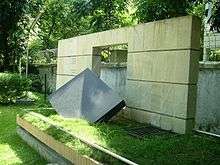
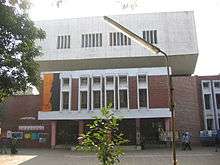
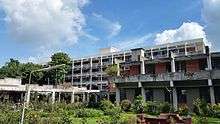
There are eight residence halls to provide housing for BUET students. The Shahid Smriti Hall is reserved for young teachers who do not have an official quarter in the campus and for the male graduate students.[26] The Chatri Hall is for female students, and the remaining six halls are for male students studying at the undergraduate level.[26] These halls were built in different periods of time, and their designs bear the history and architecture of different times.. The administrative head of a residence hall is its provost, usually chosen from the senior teachers of different faculties. 3 Assistant Provosts are also appointed in the hall administration. Most of the halls are named after several eminent figures in the history of Bangladesh. These are listed below:
- Ahsanullah Hall (named after Nawab of Dhaka, Nawab Bahadur Sir Khwaja Ahsanullah)
- Titumir Hall (named after Bengali Muslim revolutionary Syed Mir Nisar Ali Titumir)
- Chatri Hall
- Dr. M. A. Rashid Hall (named after M. A. Rashid, the first vice-chancellor of the university)
- Kazi Nazrul Islam Hall (named after the National Poet of Bangladesh Kazi Nazrul Islam)
- Sher-e-Bangla Hall (named after the 1st Prime Minister of Bengal- Sher-e-Bangla A. K. Fazlul Huq)
- Suhrawardy Hall (named after the Bengali-nationalist leader and 5th Prime-minister of Pakistan Huseyn Shaheed Suhrawardy)
- Shahid Smriti Hall (named in memory of martyrs of the Bangladesh Liberation War)
Students who do not stay at halls of residence are facilitated by the university's own commuter buses which cover major routes of Dhaka city.
Sports facilities
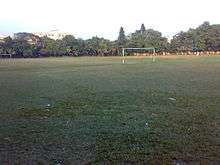
BUET has a large playground at the eastern periphery of main academic campus. It is used as venue of annual athletics competition of the university as well as cricket, football, hockey competitions. Students can access the facility all year round. Besides, visiting foreign national football teams as well as few top football clubs of Bangladesh sometimes use this ground for practice sessions. BUET has tennis court in the main academic area. It also has a gymnasium near halls of residence where students can do gymnastics and play basketball during leisure
Safety
In 2002, a first year student in the chemical engineering department, Sony, was killed during a factional clash between two feuding groups of the Jatiyatabadi Chhatra Dal (JCD) at BUET. The two factions exchanged gunfire and she was caught in the line of fire.[27]
Abrar Fahad, a second-year student of Electrical and Electronic Engineering(EEE) department, was tortured and killed by Bangladesh Chhatra League leaders in Sher-e-Bangla Hall in 2019.[28][29]
Awards and achievements
- Teams from BUET became 1st and 3rd around the globe in the inaugural International Conference on Acoustics, Speech, and Signal Processing in the 2014 IEEE Signal Processing Cup (SP Cup) at the ICASSP in 2014,[30] and 2nd and 5th place in IEEE SP Cup 2015[31] and again followed by the Grand Prize (1st place) in IEEE SP Cup 2016.[32]
- BUET teams participated in the IEEE Myron Zucker Student Design Contest in 2001, placed first, Chicago, United States.[33]
- Graduate alumnus of BUET was recognized by American Society of Civil Engineers as one of the 10 new faces of 2016 in Outstanding Projects and Leaders (OPAL) awards 2016.[34][35]
- BUET teams participated in the Asia-Pacific Robot Contest ABU ROBOCON 2005 Beijing and was awarded the Panasonic Award.
- BUET student won the 2006 IEEE Region 10 Student Paper Contest.
- BUET won the Student Enterprise Award in 2007 from IEEE.[36]
- BUET won the IEEE Vibrant Student Branch Award 2008 in IEEE Region 10 Student Congress in 2007 from IEEE
- CSE, BUET students have consistently ranked in the top 35 in the last decade at the ACM International Collegiate Programming Contest.
- BUET reached "partial double octo-final" round in open break category (44th among 400 teams) at the 36th World Universities Debating Championship 2016.[37]
Notable alumni
A large number of BUET alumni are working in the industry and academia both in Bangladesh and outside Bangladesh.
- Abul Hayat, National Film Award winning actor from Bangladesh and civil engineer, recipient of the Ekushey Padak in the year 2015 which is the second-highest state award given by the Government of Bangladesh
- Abul Hossain, an army Major General, former Director-General of BGB, former Engineer-in-Chief of the Bangladesh Army and former commandant of the Military Institute of Science and Technology
- Ainun Nishat, academic, hydrology and climate change specialist
- Alee Murtuza, former vice-chancellor of this university and renowned civil engineer
- Anisul Hoque, writer, novelist, journalist
- Aupee Karim, National Film Award winning Bangladeshi actress, model and faculty member at architecture school of American International University-Bangladesh
- A.K.M. Fazle Hussain, academic at the University of Houston,[38] has been awarded the highest awards of the American Physical Society, American Society of Mechanical Engineers and American Institute of Aeronautics and Astronautics
- Fazlur Rahman Khan, a Bangladeshi-American structural engineer and architect, considered the "father of tubular designs for high-rises", recipient of the Independence Day Award in the year 1999 which is the highest state award given by the Government of Bangladesh
- G M Quader, mechanical engineer, politician and former minister of several ministries of Bangladesh
- Gazi Rakayet, National Film Award winning Bangladeshi film director, actor and a civil engineer
- Hasanul Haque Inu, politician, former Minister of Information of Bangladesh
- Iqbal Mahmud, former vice-chancellor of this university. Recipient of the Ekushey Padak in the year 2005
- Jamilur Reza Choudhury, a National Professor of Bangladesh,[39] academic at several Bangladeshi universities, renowned civil engineer, former Adviser (Minister) to Caretaker government of Bangladesh, former president of the Institution of Engineers, Bangladesh and current president of the Bangladesh Mathematical Olympiad. Recipient of the Ekushey Padak in the year 2017
- Kamrul Ahsan, diplomat and former civil engineer, former Dean of the Asia Pacific Diplomatic Group in Canada
- Kashef Mahboob Chowdhury, architect and winner of Aga Khan Award for Architecture in 2016
- Kazi Khaleed Ashraf, architect and current professor at the University of Hawaii
- Khaleda Ekram, academic, architect and first female vice-chancellor of this university[40]
- Latifur Khan, tenured full professor and researcher at the University of Texas at Dallas.[41] Graduated from Computer Science and Engineering Department, BUET in 1993 (first CSE BUET batch)
- M. Feroze Ahmed, renowned professor and civil engineer
- M Rezwan Khan, academic and distinguished lecturer of Institute of Electrical and Electronics Engineers for the year 2017-18[42][43][44][45][46]
- M. Sam Mannan, a noted expert in process safety engineering, current professor at Texas A&M University
- Marina Tabassum, architect and winner of Aga Khan Award for Architecture in 2016
- Mohammad Fazlul Azim, Chairman of Azim Group, a leading garments company in Bangladesh. A prominent industrialist and pioneer of Bangladesh RMG sector. Former Member of Parliament of Noakhali-6 constituency
- Mubasshar Hussein, architect and former president of the Institute of Architects Bangladesh
- Muhammad Shahjahan, former vice-chancellor of this university and renowned civil engineer
- Mustapha Khalid Palash, academic and architect
- Naveed Mahbub, renowned Bangladeshi comedian, columnist, electrical engineer
- Saleh Uddin, architect and former professor at several American and Bangladeshi universities
- Shakoor Majid, architect, writer and photographer
- S I M Nurunnabi Khan, freedom fighter and writer. Recipient of Bir Bikrom award for gallantry in Bangladesh Liberation War
- Siraj Sikder, Bangladeshi revolutionary politician
- Syed Mainul Hossain, architect and the designer of the National Martyrs' Memorial of Bangladesh. Recipient of the Ekushey Padak in the year 1987
- Tanzir Tuhin, architect, musician and former member of Bangladeshi music band Shironamhin
- Tauquir Ahmed, Bangladeshi architect, National Film Award winning film director, actor
- Yafes Osman, architect, politician and current minister of science and technology, Government of Bangladesh
- Ziaur Rahman Zia, architect, musician and founder of Bangladeshi music band Shironamhin
See also
References
- "Bangladesh University of Engineering and Technology". University Grants Commission (Bangladesh). Archived from the original on 12 March 2016.
- "The registration to sit for the BUET admission test closes today". Daily Sun. Archived from the original on 5 December 2014. Retrieved 30 November 2014.
- "About BUET". buet.ac.bd. Retrieved 15 September 2016.
- "Bangladesh University of Engineering and Technology". Banglapedia, National Encyclopaedia of Bangladesh. Retrieved 8 December 2012.
- Progress of Education in India: Quinquennial Review, Issue 4, Volumes 1-2. H.M. Stationery Office. 1904. p. 263.
- Report on Public Instruction in Bengal. Bengal (India). Education Department. 1904. p. 31.
- Khan, Kamrul Hasan (6 January 2008). "BUET: 60 Years of Engineering Education". The Daily Star. Retrieved 5 July 2016.
- Islam, Sirajul (2012). "Ahsanullah, Khwaja". In Islam, Sirajul; Alamgir, Mohammad (eds.). Banglapedia: National Encyclopedia of Bangladesh (Second ed.). Asiatic Society of Bangladesh.
- Islam, Sirajul (2012). "Rashid, MA". In Islam, Sirajul; Haq, Enamul (eds.). Banglapedia: National Encyclopedia of Bangladesh (Second ed.). Asiatic Society of Bangladesh.
- "Dr. M. A. Rashid: A Short Biography". buet.ac.bd. Archived from the original on 4 March 2016. Retrieved 5 July 2016.
- "BUET starts celebrating 60 yrs of engineering education". The Financial Express. 29 July 2007. Retrieved 8 July 2015.
- "Departments". Retrieved 17 December 2015.
- "Institutes". Retrieved 16 December 2015.
- [QS ranking 2021 https://www.topuniversities.com/university-rankings/world-university-rankings/2021]
- "Bangladesh University of Engineering and Technology". QS World University Rankings. Retrieved 10 November 2017.
- "Bangladesh University of Engineering and Technology". Top Universities. 13 December 2012. Retrieved 22 September 2019.
- "Resources". lib.buet.ac.bd.
- "9th convocation of BUET on Tuesday".
- "11th Convocation 2019".
- "Administration". buet.ac.bd. Retrieved 24 June 2016.
- "Previous Vice-chancellors". buet.ac.bd. Retrieved 2 September 2017.
- "Undergraduate Admission". buet.ac.bd. Archived from the original on 11 October 2011. Retrieved 3 October 2011.
- "Foreign 2015-16" (PDF). buet.ac.bd. Archived from the original (PDF) on 15 January 2016. Retrieved 16 December 2015.
- "Research". buet.ac.bd. Retrieved 17 December 2015.
- "Conferences and Workshops". buet.ac.bd. Retrieved 2 January 2016.
- "Campus Life". buet.ac.bd. Retrieved 17 December 2015.
- https://bdnews24.com/politics/2005/06/07/sony-s-death-anniversary-observed%7Ctitle=Sony's death anniversary observed|date=7 June 2005|access-date= 21 April 2020|publisher=BDNEWS}}
- "Abrar Fahad: Killing of Bangladesh student triggers protests". BBC News. Retrieved 21 April 2020.
- "9 held over Buet student Abrar murder". The Daily Star. Retrieved 21 April 2020.
- "IEEE Signal Processing Cup 2014". IEEE Signal Processing Society. Archived from the original on 2 June 2016. Retrieved 8 May 2016.
- "IEEE Signal Processing Cup 2015". IEEE Signal Processing Society. Archived from the original on 2 June 2016. Retrieved 8 May 2016.
- "IEEE Signal Processing Cup 2016". IEEE Signal Processing Society. Retrieved 8 May 2016.
- "EEE Students Won theInternational Award". Archived from the original on 25 September 2006. Retrieved 19 June 2006.
- "Engineer Takes Inspiration from Childhood, Gives Back to Bangladeshi Students". American Society of Civil Engineers. 12 February 2016. Retrieved 13 May 2016.
- "BUET Post Graduate Alumnus Receives Prestigious Award from ASCE". buet.ac.bd. 9 April 2016. Retrieved 8 May 2016.
- "Five IEEE Student Branches Selected to Received IEEE Student Branch Enterprise Awards". Archived from the original on 18 May 2007. Retrieved 29 April 2007.
- "Thessaloniki WUDC 2016". thessaloniki2016.com. Archived from the original on 2 January 2016. Retrieved 2 January 2016.
- "Faculty - Dr. Fazle Hussain". University of Houston. Retrieved 8 December 2012.
- "3 educationists become national professors". The Daily Star. 20 June 2018. Retrieved 20 June 2018.
- "Architecture Professor Khaleda Ekram first female BUET VC". bdnews24.com.
- "Dr. Latifur Khan". The University of Texas at Dallas.
- UIU Vice-Chancellor Selected as Distinguished Lecturer of IEEE - United International University (UIU)
- Khan, M. Rezwan - Department of EEE (UIU)
- "UIU VC made distinguished lecturer of IEEE". Daily Sun.
- "UIU VC selected as distinguished lecturer of IEEE". New Age.
- "UIU's vice-chancellor selected as lecturer of IEEE". Dhaka Tribune. Retrieved 13 May 2016.